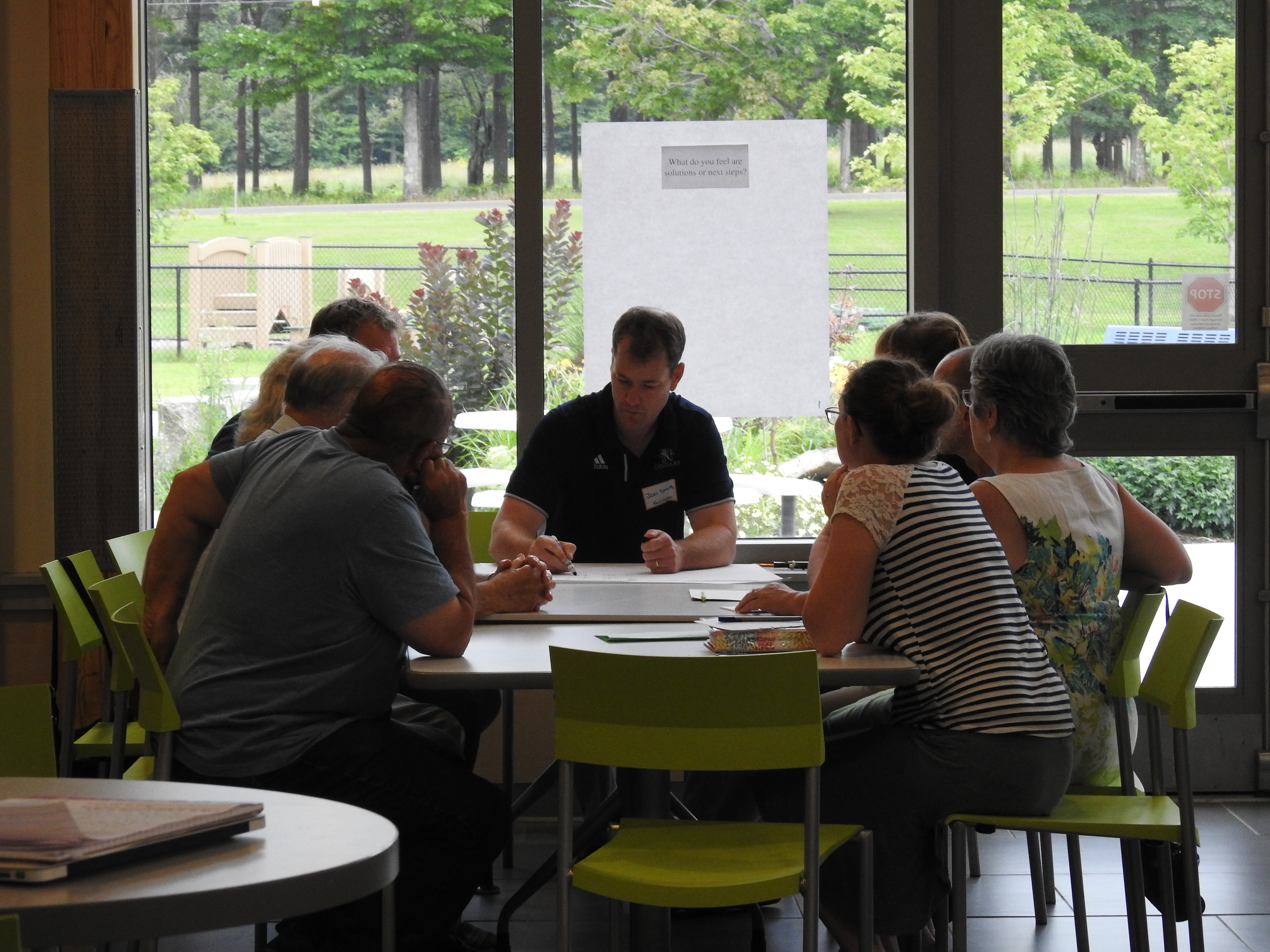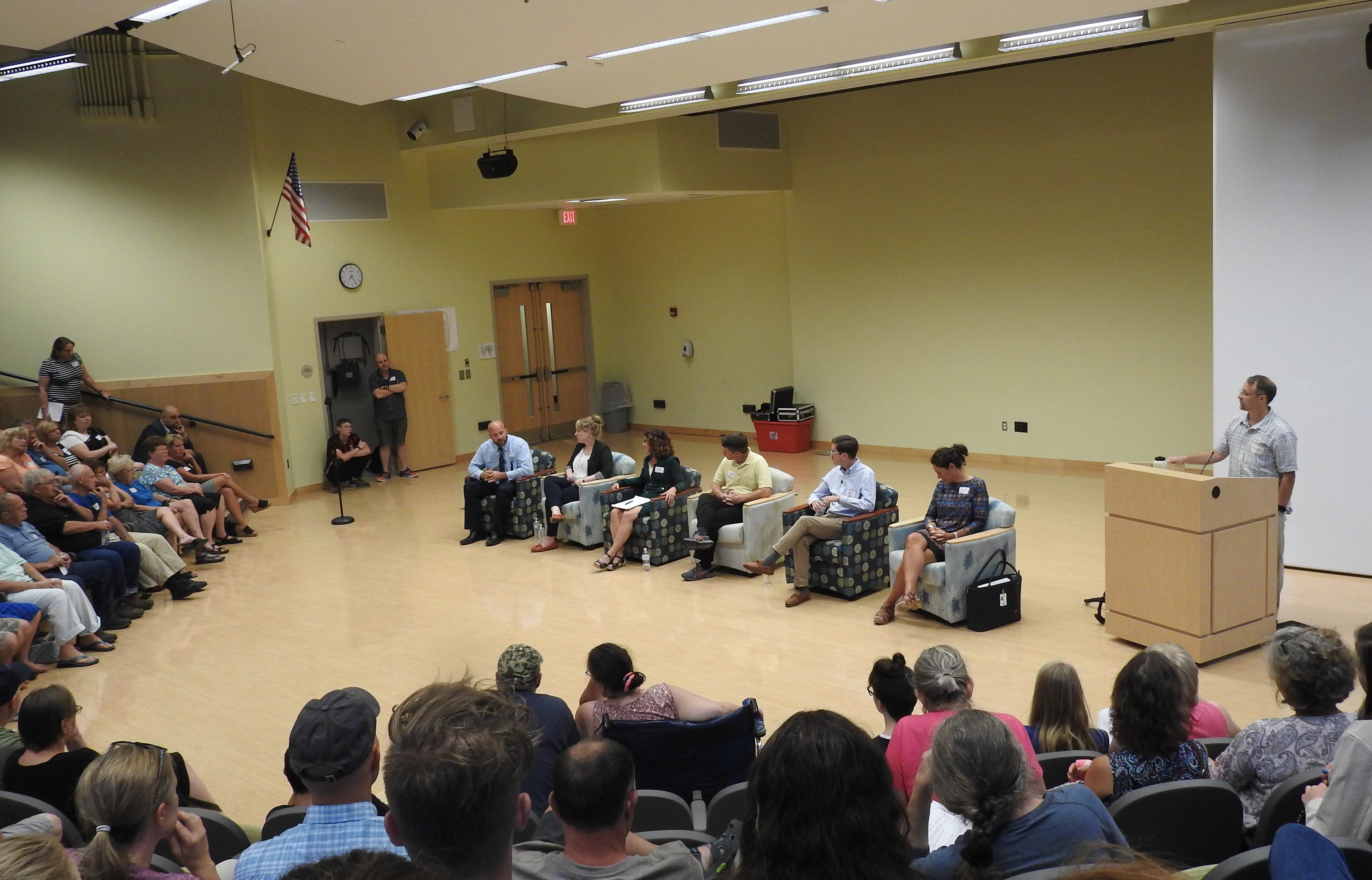
FARMINGTON – More than 100 parents, students, educators and community members attended a forum on Proficiency Based Education Tuesday evening, discussing concerns, improvements and the next steps for Regional School Unit 9.
The issue recently leapt into the forefront after state law was changed on July 22 to allow school districts the option of implementing a Proficiency Based Diploma, as previously required by a law passed in 2012, or a traditional diploma, beginning with the graduating class of 2021. A PBE diploma requires students to show proficiency in English, math, science and technology, social studies, health and physical education, visual and performing arts, world languages, and career and education development. A traditional diploma is based off a number of classes, with students meeting class objectives to earn credit. Both diplomas, Superintendent Tina Meserve said, must certify the learning of the student.
The law change specifically impacts the PBE diploma requirement, not other, PBE-related elements of the 2012 law, such as Response to Intervention, or RTI, which provides a system of support for students not meeting content standards.

The last school year was the first rollout of PBE at the high school for the then-freshman class. Since then, Meserve and other administrators said Tuesday evening, they had been meeting with students, a committee of educators and the public through informational meetings to gauge areas that need improvement. Some of suggestions spoke to more consistent use and display of rubrics, effectively charts that explain what the student needs to do to receive a 1 through 4 grade on a standard, inconsistencies in when students can be reassessed on a standard and general confusion about the grading system. Some proposed changes include displaying the more traditional 0-100 score on PowerSchool, in addition to the 1 through 4, having course scores go to the tenth point (i.e. 2.7, rather than 2.5 or 3) and allowing 10 percent of a course score to encompass practice work, as feedback from students included a lack of motivation to complete homework that was effectively ungraded.
The change in the law comes at a difficult time for districts, Meserve noted, as teachers are gone for the summer. The school board will need to determine a direction in less than a month, as teachers report back on Aug. 27. Students come back to school two days later. Meserve said she intended to gather feedback through events such as Tuesday’s meeting before making a recommendation to the board. In any case, incoming juniors and seniors would continue operating under traditional diploma requirements.
Further complicating the issue is that the legislature will not engage in the discussion and implementation of regulations and guidance regarding the new law, a process known as rulemaking, until after Jan. 1, 2019, when the law goes into effect.
“I think we have tough decisions to make,” Meserve said. “It’s not ideal.”

The approximately 100 attendees of the meeting broke into groups for roughly 40 minutes, listing concerns, potential improvements and next steps to facilitators that wrote everything down on big sheets of paper in the cafe. Meserve and the other administrators said they intend to go over that information prior to developing a recommendation to the board.
After the small groups reassembled in the Mt. Blue High School forum, a panel made up of Meserve, two principals, the Curriculum Coordinator Laura Columbia and two representatives from college admissions departments answered questions for approximately an hour and a half. One common concern expressed Tuesday included whether PBE put RSU9 students at a disadvantage with colleges as compared to other students with traditional diplomas. Both John Hayes and Sam Pelletier, who work at the University of Maine at Farmington and Colby College admissions departments, respectively, said that they believed it did not. Colleges routinely received transcripts with different grading systems, program strength and even languages, Pelletier said. It was up the admissions department to determine the context of the transcript, he said.
“I don’t think [a PBE diploma] has ever been held against somebody,” Hayes said. “We take a holistic view of the student.”
Some parents said that PBE had left their children unmotivated, either because it was unclear how or too difficult to get a exceeding standard 4, rather than the meeting standard 3, or because their peers were also getting 3s while doing less studying. Columbia said that one area of improvement would be having teachers clearly explain what a student needed to do to exceed the standard, and make sure that work was possible within the context of the lesson, rather than as a take-home project or extra-credit assignment.

Other issues listed by people during either the Q & A or the group feedback included whether teachers had adequate professional development time for PBE, concerns with PowerSchool, how the new system can affect student morale and self-esteem, and making the system clearly understood by parents and students. Part of the issue, Meserve said, was the lack of resources provided by the state in 2012 to educate the public or assist the schools.
Meserve said that the information collected Tuesday would be compiled and considered prior to her recommendation to the board regarding the PBE diploma for the coming school year. The board is expected to take up the issue at the next two meetings.





Based on the general attitude of the Superintendent, and her supporters, PBE will never go away. And those who are unhappy about the way their kids are being educated, or not, should remember this when it comes to the Budget deliberations. If the Superintendent won’t listen to some of the teachers, many of the parents, or people in general, why should the public support another inflated budget.
PBE seems to cater to the kids on the low end of the scale, but ignores the brighter kids who could really excel.
And PBE seems to destroy kids’ positive attitude toward school by lumping bright kids in with kids who are less motivated to learn, and rewarding lazy kids with grades equal to those who work hard.
Nothing good can come from this system.
For once I can agree with Nancy on something. Her second paragraph is spot on along with her opening sentence!
We do not need PBE scoring or the 0 to 100 type scoring for any of students.We will get along fine in today’s everyone gets a trophy attitude put out by the liberal thinkers.Simple way to find out what people want is to vote on it.
The organizing of the meeting was thoughtful. By forming small groups of students, parents, and community members, every one had a better chance of contributing his thoughts and knowledge of the PBE system. It was recorded on paper by the facilitator, surely can’t be forgotten. I hope this information will be used in making “the decision on the choice of continuing with PBE or returning to traditional ranking and diploma requirements. I hope the response doesn’t come back as a refrain, “we’ll address that issue.” “we’ll get back to you on that concern”,”we’re working on it,” and others. The Q/A session was also with thought, using mikes, and extending the session so all who wished could be heard. The response from the 6 member panel was for the most part in defense of PBE, never once was heard a positive comment about traditional methods.as scoring, earning diplomas, ranking reports to students/parents etc. On the other hand, those in audience attendance were by question and comment overwhelmingly in opposition to the PBE program and its continuance. Many reasons for its being discontinued were given. While the law overturning PBE’S mandate doesn’t take effect until January 2019, it is doubtful that what starts at schools beginning will change at half year.
What do you expect from this ‘everyone deserves a trophy’ society? Is it safe to assume PBE makes an educator’s job easier?
Captain: Easier for educators? No.
Better able to find what a student knows, and can do, or doesn’t know yet? Yes
As likely to get into a good/great college? Yes….the admissions agents suggested depth of study counts: College Prep, Honors, AP coursework..(These have not changed at all)
A trophy for all? not really…..by a PBE diploma, mastery of the topics of study has to be proven, at a higher level than previously. This PBE stuff actually raised the graduation standards for many, while the “good students” would still go above and beyond the minimum required credits and scores, and go more deeply into advanced studies, or they would not get into the colleges of their choice.
So many misconceptions……and so easy to share them! Take a look at the course of study book for the high school to see that no advanced courses are dropped.
Have a nice day!